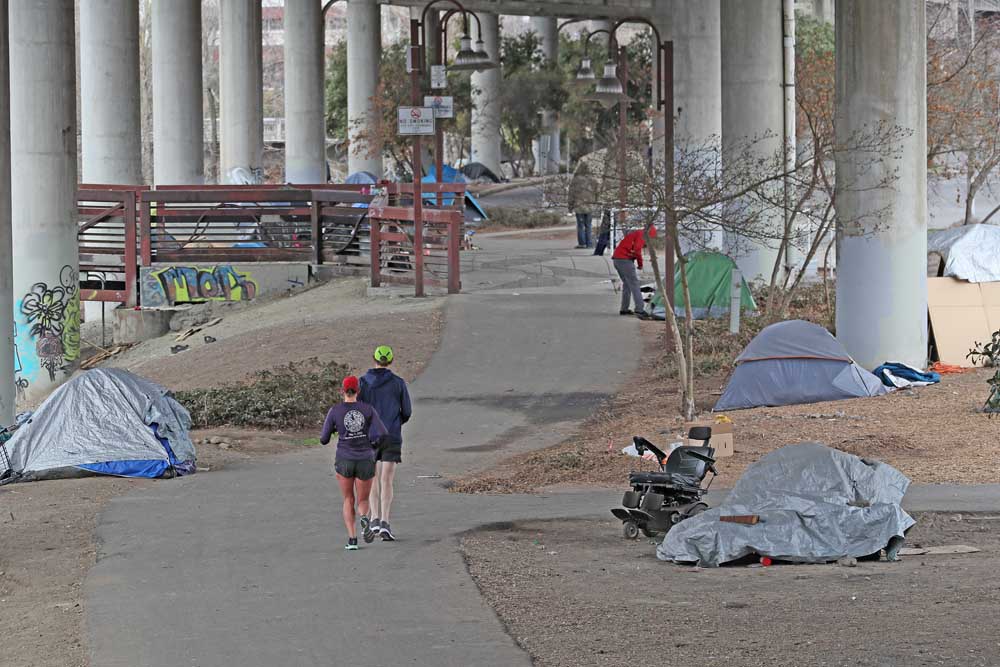Judge sides with Medford in lawsuit, finds city’s camping ordinances constitutional
Published 2:30 pm Wednesday, January 31, 2024

- Runners pass between tents under the Interstate 5 viaduct in Medford. Medford City Council will consider a law Thursday that would allow police to remove homeless campsites more quickly.
Citing ways that Medford’s response to the homelessness crisis differs from landmark cases in Grants Pass and Boise, Idaho, a federal judge has deemed Medford’s time-place-manner camping ordinances constitutional.
U.S. District Court Magistrate Judge Mark D. Clarke earlier this month sided with the city on all counts of a civil rights lawsuit filed by six homeless individuals represented by local defense lawyer Justin Rosas.
Rosas, on behalf of Andre Bilodeau, Robert Bessy, Amber McNab, Greg Killingsworth, Travis Greiner and Ronda Bjork, alleged that city maintained a web of ordinances — such as a camping ordinance that put time-place-manner restrictions on unauthorized camping — violated their constitutional rights.
Clarke disagreed. In his findings and recommendation filed Jan. 16, he recommended that summary judgment be granted in the city’s favor on all claims, and upheld the constitutionality of the camping ordinances in Medford’s municipal code since 2021.
“The court is mindful of staying in its narrow lane of evaluating whether the recent city of Medford ordinances, enacted in response to the homeless crisis, are constitutional,” Clarke wrote. “The court has found they are.”
Medford’s camping ordinance, passed in 2021, limits times and places where camping is allowed, but does not ban it outright. The ordinance was crafted in response to class-action rulings in Martin vs. City of Boise — which deemed arresting people for sleeping on streets to be cruel and unusual punishment in 2018 — and Johnson vs. City of Grants Pass, which expanded protections for public camping. The Grants Pass case was formerly known as Blake vs. Grants Pass prior to the death of plaintiff Debra Blake.
Clarke’s findings and recommendation is not a ruling. His recommendation will be referred to Judge Ann Aiken, who will make the final order. The city of Medford and Rosas had until Jan. 30 to file objections for Aiken to consider. As of Wednesday, court records show no such filings from either party.
When reached for comment Wednesday, Medford City Attorney Eric Mitton emailed the following statement:
“The city of Medford is pleased with the court’s findings and recommendations in this matter, which are detailed and well-reasoned. The city appreciates the court’s recognition that the city’s multi-faceted approach to the homelessness crisis meets all applicable constitutional standards.”
A message to Rosas’ office Wednesday morning was not immediately returned.
Clarke in 2020 wrote the findings and recommendation in the Grants Pass case, which were largely upheld by the Ninth Circuit Court of Appeals and are headed to the U.S. Supreme Court. In the Medford filing, Clarke clarified his reasoning in the Grants Pass case.
He found that Grants Pass’ lack of shelters at the time fell in line with precedent set in the Boise case. Boise had three shelters “each privately-run and religiously affiliated,” and Grants Pass had no “shelters that met the United States Department of Housing and Urban Development criteria.”
“Applying ‘Martin’ (vs. Boise), this court held that in light of the city’s lack of adequate shelter, its practice of punishing the act of sleeping constitutes cruel and unusual punishment in violation to the Eighth Amendment,” Clarke wrote.
In contrast to Grants Pass, Clarke devotes at least four pages of his 23-page filing to Medford’s response to the homelessness crisis. He describes the city’s work with Rogue Retreat using city-owned properties to construct the tiny house campground Hope Village on West McAndrews Road, and the new Navigation Center and the Kelly Shelter on Market Street.
He highlights how Medford has spent an estimated $19.5 million to support homeless services over the last three years, and the city’s work with the Oregon Legislature, the League of Oregon Cities and the Oregon Law Center to pass Oregon House Bill 3115 in 2021, which worked to codify the requirements set by the court rulings into state law.
“Where a city has participated in making multiple shelters available, it reflects a commitment to assisting their unhoused neighbors, and it lends itself to the reasonability of whatever restrictions are in place. … The court finds little utility rebuking those efforts, particularly where many of the seeds have been recently planted and require time and dedication before their adequacy can be measured,” Clarke wrote.
Clarke stated that the Grants Pass and Boise rulings were not designed to require local governments to “provide commensurate shelter or strike down all restrictions.”
“’Blake’ (vs. Grants Pass) rests on the notion that cities have a dual obligation: they are charged with protecting the safety and welfare of their citizens, as well as respecting the dignity of their homeless residents,” Clarke wrote.
Highlighting a section from the 2020 Grants Pass ruling, Clarke states that the city of Grants Pass was free to “implement time and place restrictions for when homeless individuals may use their belongings to keep warm and dry.” Cities “may ban the use of tents in public parks” just as long as they don’t outright ban people from using materials to keep warm and dry.
Medford’s ordinance falls within those guidelines, Clarke noted, meaning that the six plaintiffs “do not face a city-wide ban on sleeping or camping.”
Rosas had argued that by “punishing the acts of resting, sleeping or seeking shelter in public … Medford effectively punishes the status of homelessness.” He initially filed the lawsuit seeking class-action status in May 2021, but the court denied class-action status in late 2022 citing insufficient evidence and Rosas’ lack of experience with complex civil cases.
Clarke’s Jan. 16 filing shows that many of the arguments made by Rosas suffered from a similar “lack of support.”
For instance, Clarke noted “no evidence submitted on behalf” of four of the six homeless individuals named in the suit. Separately, Clarke chided Rosas for his 851-page response brief.
The filing included nine exhibits, but Clarke noted that many of them were rarely cited, “inappropriately cumbersome” and not formatted for easy reference.
“Without page numbers, the scant citations found in the response brief are inappropriately cumbersome and generally fail to explain how each exhibit supports Plaintiff’s constitutional claims directly,” Clarke wrote. “For example, Exhibits 5 and 6 are relied upon solely to show the workload and pay of a public defender.”
Elsewhere, Clarke noted that under current legal precedent, homeless people were not a protected class, notwithstanding a poem Rosas cited.
“Plaintiffs’ recitation of ‘New Colossus’ by Emma Lazarus does not change that fact,” Clarke wrote. “While arguments that the unhoused represent a vulnerable group are well taken, the court is bound by precedent and plaintiffs have not brought a case that could adequately support homelessness as a protected or suspect class requiring strict scrutiny.”






